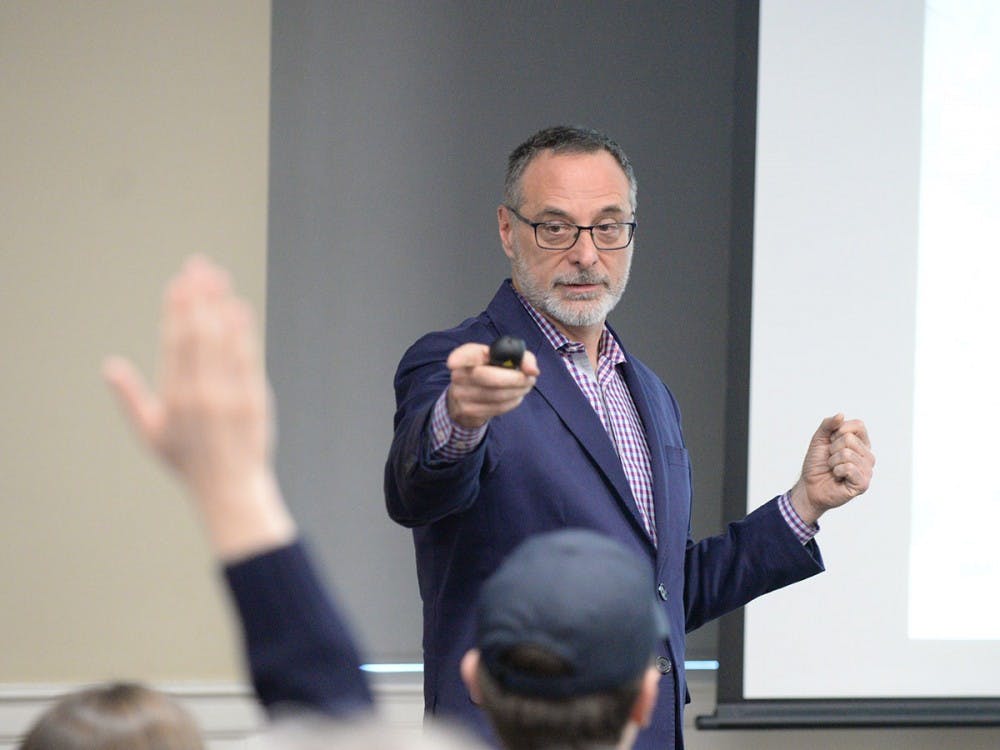The University’s Office of the Architect held a community listening session at Newcomb Hall Thursday afternoon to allow for students, faculty and community members to voice their concerns on the proposed construction of a softball stadium at Lambeth Field. The meeting room was almost at full capacity.
The University Board of Visitors Buildings and Grounds Committee decided last month to defer the decision to select a site for the stadium following criticism of the plan from students and local residents.
Joe Celentano — a principal at the VMDO architectural firm in Charlottesville who is working on the stadium project — said no final decisions or recommendations concerning the construction of the stadium have been made to the Board of Visitors.
University Architect Alice Raucher said Lambeth Field is only one of 11 potential sites around Grounds being considered for the construction of the stadium, and that there are other “viable options” being considered as well.
Other sites under consideration include a portion of University Hall’s parking lot, the tennis courts near Memorial Gym, land near the Copeley Hill student housing units and Perry Field near University Hall. However, Raucher added that many of the additional sites — including one proposed in the parking lot of Scott Stadium — would likely be removed from consideration soon.
“With almost all of these sites, you can imagine there is no site sitting there waiting for a softball stadium,” Celentano said. “No matter what we do, there's going to be some trade-offs we’re going to have to make.”
Raucher said that the project has not been planned in direct consultation with the Planning and Coordination Council ― a regional planning committee between the City of Charlottesville, Albemarle County and the University ― as it has not been officially selected for examination by the body. However, Raucher added that project planning materials had been shared with the county and city.
Many attendees of the session lamented the lack of outreach and community engagement conducted by the University in proposing Lambeth Field as a potential construction site for the stadium.
Carter McCants, a fourth-year College student and Senior Resident for Lambeth Field Apartments, said the University did not adequately engage students during the planning process.
“The student engagement aspect of this whole entire plan excluded a lot of those involved,” McCants said. “I understand as a woman all about equality, and I want the best for our softball team, but I would say as representing the residents who live in Lambeth that that is not in their best interest.”
“In terms of student engagement, I think that asking residents, asking students before this plan was made and proposed as to whether they would want to be engaged in softball was important,” McCants added.
In response to concerns regarding the historical value of Lambeth Field and its importance to the local community, Raucher said the construction of a stadium at Lambeth Field was originally intended to honor its history and continue to serve as center for community engagement.
“[We thought ] using a historic property for its intended use … would be a great thing to be in the neighborhood, it would sponsor community engagement,” Raucher said. “Clearly we didn't listen and bring this to the community early enough.”
Fernando Operé — a professor of Spanish at the University and a resident of University circle near Lambeth Field — said the field serves as an essential location on Grounds for students, faculty and community members to interact.
“There is not a single moment when people are not playing or doing something in the field,” Operé said. “It is the only field, the only space at the University of Virginia where the students, professors and community get together … and we cannot destroy that.”
Operé added that many of the leaders of the stadium construction project likely do not spend time at Lambeth Field and were detached from the needs of the University and students communities.
“My surprise is, since we began this discussion, is that many people who are going to make the decisions have never been to Lambeth, never walk in Lambeth,” Opere said. “We have this extraordinary, beautiful landmark almost as valuable as the Lawn, and we have to preserve that.”
In response to a question concerning the University’s urgency to begin the construction process of the stadium, Raucher said the University did not want to continue denying female athletes at the University the professional facilities that male athletes have.
“It’s about equality between women’s and men’s sports,” Raucher said. “Frankly, where we have softball right now is substandard to what is happening for men, and we really need to do something, so it is quite time-sensitive.”
“We feel as an institution, as an administration and a board that we need to do something to improve the situation for the women's’ softball team,” Raucher said.
In addition to Thursday’s meeting, another engagement session will be held at Lambeth Commons Jan. 30 at 6 p.m. to allow for students to share their opinions on the project with its design team. A listening session with arts faculty will take place on Jan. 29.
A second public listening session will also be held before the Board of Visitors discusses the project in March.
Corrections: This article previously misstated the listening session with arts faculty will take place Jan. 31. The article has been corrected to note the meeting is scheduled for Jan. 29. This article also previously misstated that Alice Raucher said planning materials for the proposed stadium had been shared with the Planning and Coordination Council. The article has been updated to note that she just said the materials have been shared with Albemarle County and the City of Charlottesville.







